Dragon Boat Racing in Minamata (July 29-30)
Erica and Renee met us on the other side. We did a little sight seeing in Tamana. We saw the largest bell in all of Japan,

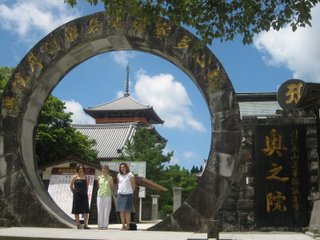
a beautifully-kept pagoda
 and wandered up to a large statue of a Buddha overlooking a hill. It was such a clear day that you could see all the way to Nagasaki!
and wandered up to a large statue of a Buddha overlooking a hill. It was such a clear day that you could see all the way to Nagasaki!
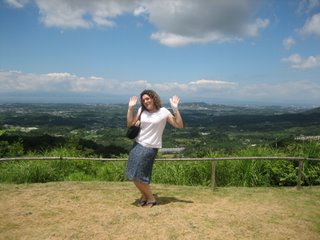
We then started to make our way down to Minamata (about 2 hours south of where Erica lives), where the dragon boat race was going to be held the following day. Erica, Renee, Amber and myself were placed on a 'foreigner's team' along with the ALTs from Minamata. We were going to participate in an exhibition race.
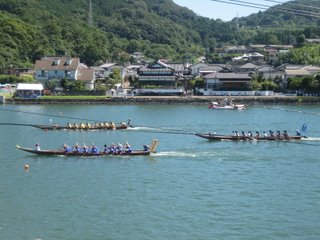
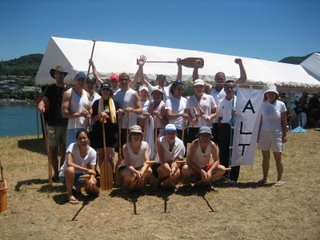
This kind of boating requires all 14 people to paddle in unison. That's no easy task..With a broken thumb, I was unable to contribute to the paddling. However, there are two other 'positions' that don't require any paddling...laying at the front of the boat and yelling encouragments while waving a flag around or banging on a steel drum to keep people paddling in unison. My job was to bang the drum.
While standing in line waiting for our turn to get into the boat,
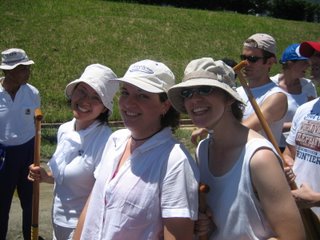 we noticed that we were the only team with paddles in our hands. Just before going in, we were told that these were special oars to facilitate the paddling. You may think this was an unfair advantage over the other teams, but I guess they thought we needed the extra help. I'm sure that when they saw us pushing off from the docks, paddles all over the place and the dong going at random times they must have thought we'd need more than specially shaped oars to get us to the finish line without capsizing...
we noticed that we were the only team with paddles in our hands. Just before going in, we were told that these were special oars to facilitate the paddling. You may think this was an unfair advantage over the other teams, but I guess they thought we needed the extra help. I'm sure that when they saw us pushing off from the docks, paddles all over the place and the dong going at random times they must have thought we'd need more than specially shaped oars to get us to the finish line without capsizing...
We were a little uncoordinated at first. After having pushed away from the docks, our first challenge was to turn around to head to the starting line. As we came close to the docks again, we had a near collision with another boat pushing off..

Making our way to the starting line gave us all a chance to practice and get a feel for what it's like before the race began. Considering the group members' varied boating experiences (ie no boating experience whatesover to very experienced) and the fact that we'd never boated together, it was a pleasant surprise to find that we finished 2nd!! (out of 3..)

After the race, we had a quick lunch. Maybe a little too quick because Erica started filling ill.. I offered to do the rest of the driving, and she happily agreed. Erica made herself nice and comfy in the back, and I couldn't resist taking a picture.
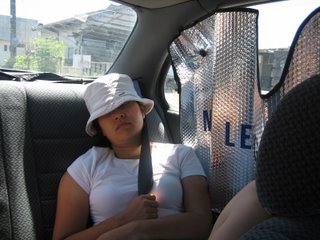
We were all pooped. Not just from the racing, but the heat really takes its toll on you. We decided to get cleaned up in an onsen that recently opened not too far from Erica's place. On our way, we stopped at a Spanish villa winery and picked up some omiyage. The winery was at the top of a hill, Spanish architecture, flaminco dancers, the whole set up made you feel like you were in Spain.
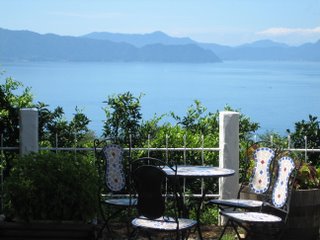 From there, we continued our long car ride back to Erica's town, singing along with the Ipod at the top of our lungs and taking pictures.
From there, we continued our long car ride back to Erica's town, singing along with the Ipod at the top of our lungs and taking pictures.
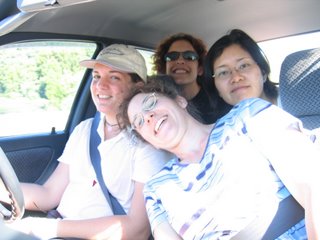
We got cleaned up at one of the more elegant onsen I've ever been to, then stopped at an Indian restaurant for dinner before continuing on to the port.
Amber, an aspiring young writer (she's gotten some of her stuff published in a couple of magazines in the States!) wrote the following of the trip we took together to Kumamoto. With her permission, I've posted it below. I've included some pictures as illustrations to her narrative, will add more when I get a chance.
Just Another Weekend In Japan
I was standing on the street corner in the scorching midsummer heat when Michelle’s purple car appeared around the bend in the road. I tossed my bag in the bag and jumped in, and even the weak jet of lukewarm air was a relief from the oven-like heat outside.
“Sorry if I’m a couple of minutes late,” she said as she made a quick u-turn.
“No problem. Where are we going, anyway?” I said, struggling to sit up straight and find a place for my feet in the tiny car.
“I’m not really sure. We’ll take the ferry across to Kumamoto and then my friend Erica will pick us up. After that, I have no idea.”
It was a sign of things to come. The entire weekend would be like that, a sudden jump from one activity to the next like a crazy game of schoolyard leapfrog.
When we pulled into the ferry port an hour later, the ferry looked ready to depart.
“It leaves at ten past ten,” Michelle said, looking down at the small time display on the dashboard. It read 10:08.
“Crap. We’d better run!”
We grabbed our bags and leapt out of the car. I had brought a small bag with a pillow and a sheet, since Michelle had told me we might have questionable sleeping arrangements (read: somebody’s floor) that night. The bag smacked into my knees as I ran, almost causing me to fall as I followed a similarly burdened Michelle across the parking lot, through the ferry terminal, up the stairs, down the gangplank and onto the boat. We also managed to toss some money at the ticket attendant, and she seemed bemused (as many Japanese people usually were) to see two sweaty foreigners trying to run with too much stuff.
As soon as we were across they lifted the boarding platform and the ferry took off. We were on our way, across the c-shaped bay from Nagasaki to Kumamoto prefecture. After we caught our breath, we took a moment to look out on the scenery. It was a gorgeous day. The sky was the pristine blue you only really notice in summer, when the sun is shining so bright it hurts to look up. The water below was a murky green bordered on opposite sides by long, curving stretches of coast.
Forty five minutes later we were on the other side, walking out into another ferry terminal and looking into the smiling faces of Michelle’s friends. Erica was a Japanese-Canadian ALT, with a short bob of straight black hair and a friendly smile. She was quieter than Renee, her companion, an American ALT with a crazy mop of curly brown hair piled haphazardly on the top of her head. Raised on a farm in Wisconsin, she reminded me of a hippy who hasn’t quite made the final step to vegetarianism. She talked a steady stream of run-on sentences, and I couldn’t help but admire her gusto. She was energetic about everything, and I knew as soon as I met them both that it was going to be a good weekend.
The next thing I knew we were in Erica’s little grey car, racing down windy roads in the Japanese countryside. All around were green hills and rows of tidy grey and brown houses. I didn’t know where we were going but I didn’t care, because I felt a sudden exhilaration at allowing myself to be carried along in the tide of events.
The first place we visited was a temple with the “largest bell in Japan,” where we watched an orange-robed monk swing his full body weight under the long wooden pole in order to slam it into the side of the bell with a resounding gong.  We wandered past ponds filled with red and orange-splotched koi and up long stone steps where a giant Buddah statue looked out and down on everything. We took silly pictures with Buddah before heading back down again to the car.
We wandered past ponds filled with red and orange-splotched koi and up long stone steps where a giant Buddah statue looked out and down on everything. We took silly pictures with Buddah before heading back down again to the car.
We drove to a park-like area with freshly lawned grass and trees. Interspersed amid the trees were little workshops where traditional Japanese crafts were made.
“What is this place?” I ask.
“It’s the older part of town. They have festivals here,” Erica tells me.
“What are we doing here?”
“Because I want a flute!” Renee says, and then looks down at a steep grassy slope. “I can’t resist, I can’t!” she shouts and lays down on the grass, rolling all the way down the hill shouting, “Wheeeeeee!”
The slope looks a little muddy and I am afraid (as always) of Japanese bugs, but part of me is jealous that I don’t have the guts to hurl myself down too, consequences be damned. Renee comes back up with grass and mud stains on her white linen pants, smiling and skiping down the road ahead of us. We follow like mice following Peter Piper.
We arrive at a small cabin where a man makes bamboo and wood flutes by hand.
We spend the better part of an hour in his shop, as he shows Renee the flutes with both Japanese and Western-style tuning. He plays us a song or two, high screeching melodies that sound like frightened birds, but we smile and clap and think how cool it is to see traditional Japanese culture like this.
Finally, Renee picks a flute to her liking and we are on our way again, to a small market where the fresh fruits and vegetables line the walls and floor. We must buy presents for the lady with whom we will be staying tonight, Erica informs us, so we pick up a watermelon twice the size of a bowling ball and cherry-blossom soba noodles in a pretty pink package. It is enough, we finally agree. I find myself getting impatient with this slow moseying pace, and the way it seems to take forever to make a decision because nobody wants to be the Bossy One.
I have to force the impatient voice in my head to Shut Up, because after all it’s kind of cute the way Renee is so easily distracted (“Oooh look! Gourds!”) and the way Erica frets for twenty minutes about whether or not the watermelon and noodles are enough and shouldn’t we buy something else, too? I just smile and watch the people go by and enjoy the cool, air conditioned interior of the supermarket. After all, where did I need to be?
Then we are back in the car again, down another windy stretch of coastal road. We are talking and I find myself laughing more than I have in ages, laughing so hard tears come to my eyes and my stomach hurts. We are trying to find a girl named Ana, Erica tells us, and we get lost two or three times on the country roads that fork suddenly and don’t have signs to tell you when you have left the main road and gone Somewhere Else Altogether.
At last we are there. It is a beach, a pretty stretch of blond sand meeting green water in a peaceful embrace. As we park on the side of the road we can see them, a group of foreigners splashing and screaming in the water, about ten of them. It is late, past five-thirty, but the water looks cool and inviting after hours in the car, and it doesn’t take much to convince us to throw on our bathing suits and join in.
Ana comes up to meet us, a big girl with dark skin and wide brown eyes, and a circular tattoo wrapping around her forearm. The tattoos are a tradition of Samoan culture, I later learn. Ana speaks with an accent that sounds Australian, and I realize that I do not know much about Samoa, and when I get back I must look it up on the internet. Ana is friendly, and it is with her host mother that we will be staying that night.
After a quick change in the bathroom we race down to the water. It is warm and a deep opaque green, probably caused by algae. Japanese beaches are often polluted, but we do not want to think about this as we dive in and swim around. As we get deeper we are surprised to feel a thin later of cold water at the bottom, and as we swim we get little chills as tendrils of icy water brush our feet and ankles.
The other people in the group introduce themselves as they swim by. I foget their names instantly, knowing it won’t matter. Most of them are heading back to their respective homes that week, their time in Japan complete. This weekend is their last hurrah before hitting the road.
Although part of a larger group, the four of us who came together stick together through most of the day. Somebody passes us a frisbee and we play in the water, squinting in the bright sunlight of late afternoon. At one point Renee and I run to the shore and do a quick succession of cartwheels, and Renee does a sumersault only to complain about getting sand in her swimsuit. It didn’t matter, because by the time the sun was hidden behind the western hills we were all full of sand.
The group split into two sections, each going to one of two different houses where everyone could shower before the evening festivities. We went to Ana’s boyfriend’s house a large, muscular Samoan who could have intimidated death row inmates if not for his sweet, soft-spoken disposition. His house was mostly empty; he was going home in a couple of days. We took turns scrubbing off the sand and salt in the shower and sitting on his bare wooden floor and passing the time with empty chatter.
After we were all clean, Renee talked Erica into trying vegemite, an Australian delicacy that is made of concentrated yeast extract. It’s very salty, and when I’d tried before it it had reminded me of a very salty caviar. Not delicious, but I could see how it could be an aquired taste. Erica was eager to try the delicacy but wrinkled her nose at the salty flavor. “It tastes like soy sauce on bread,” she complained, and after eating a few bites handed the other half of her slice of bread to Ana’s boyfriend, who devoured it in one bite.
It was dark, then, and time to meet up with everyone else for dinner. I was starving. We’d grabbed indian food for lunch in between our other activitieas, but now that seemed like a million years ago and my stomach agreed with me by voicing its protest. Trying to rush a big group is like trying to rush a giant elephant, however, and it took over an hour to assemble everyone at Ana’s house and then get downtown. It was festival time, and when I asked what it was for Ana said, “I don’t know, really, some kind of fisherman’s festival, or something.”
Whatever it was, it was impressive. All along the main street groups of people in costumes were dancing to loud music. 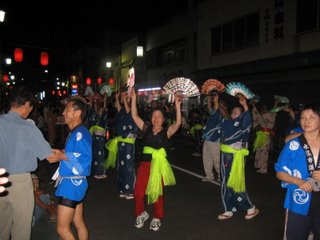 Each group represented a different association or company in town with a different dance each group member did in synch. The post office workers all wore bright orange t-shirts and had the most organized dance that I saw (it figures!), and other groups were women in identical kimonos or men dressed in drag. Everywhere we went, people tried to drag us into their group to dance with them, and we snapped photos of Renee and Erica dancing with a group of blue-shirted people wearing white headbands. One of them turned out to be Ana’s host mom, our hostess for the night.
Each group represented a different association or company in town with a different dance each group member did in synch. The post office workers all wore bright orange t-shirts and had the most organized dance that I saw (it figures!), and other groups were women in identical kimonos or men dressed in drag. Everywhere we went, people tried to drag us into their group to dance with them, and we snapped photos of Renee and Erica dancing with a group of blue-shirted people wearing white headbands. One of them turned out to be Ana’s host mom, our hostess for the night.
Then the music stopped suddenly and just like that it was over, everyone heading off to the different restaurants lining the street for the big parties that follow such events. Ana’s host mom tried to invite the four of us in with her group, but we were too many and ended up joining the other foreigners at Gusto’s, a cheap-but-good food joint that hit the spot perfectly.
Most of us got hamburgers because greasy food seemed just the thing after a long day in the sun. We ate and drank and talked and I was shocked to look at the clock again and see it past ten already. I was exhausted, and the rest of the night was a blur of driving and getting to the host mom’s house. Out in the country the stars were so clearly visible it was amazing. There was scorpio, my sign, bright and clear in the sky, and nearby the faint, fuzzy outline of the milky way like a night-time rainbow.
The host mother’s name was Shoko, and her house was filled with a cornucopia of travel souveneirs. Along each wall were photos from all the places she’d visited, and under the kitchen counter a long case of collector’s spoons, each handle decorated with pictures or carvings from different places. Shoko was one well-traveled woman, and she lived with her aging parents, husband, and children in a large wooden house. Erica and I got the bedroom upstairs, up a steep flight of wooden steps where there were actual beds instead of futons. Even better, the wall air conditioner would keep us cool while we slept, because the upstairs rooms would be like ovens this time of year.
I was so tired I had trouble falling asleep when I got into bed, still trying to grapple with all the events of the day. It all seemed to jumble together in my mind, and I struggled to remember what we had done first, or second, or last. In the end I put on my ipod to one of my audiobooks, a hypnosis sleep tape that never fails to get me to relax.
“You will fall asleep,” the tape voice said. And I did.
The next morning we were off to the races—literally. After a pleasant breakfast provided by Shoko, we head to the waterfront to take part in the Minamata Dragon Boat Race, on the ALT Exhibition Team. We were an “exhibition” team because we weren’t “real” racers—considering few of us had ever rowed a boat before, let alone a dragon boat. We would race after the “real” races were complete, and consider ourselves lucky if we didn’t sink the boat or crash into one of our competitors.
All along the waterfront, the different racing groups had set up tents to provide shade, and we took off our shoes before stepping onto the blue tarp where we would sit and wait for our turn. We were high up on an embankment looking down on the water, and although I was still sleepy from yesterday’s activities I was excited at the idea of being on a boat again. I’d been sea kayaking a few times in San Diego, and I loved it. The boating didn’t look too hard. Each boat was a long canoe-like craft with seven people manning the right side and seven people manning the left. Each person held only one oar, dipping their bodies down in short, powerful strokes in perfect rhythym with everyone else. That would be the hard part, I knew, with this mismatched assortment of unseaworthy ALTs.
At the front of the boat a man sat with a small magaphone to shout out the rhythym of the strokes, and in the middle a bell ringer who smacked a bell with two small hammers to the beat of the strokes. Gong-gong-gong, pause. Gong-gong-gong, pause. Three boats competed at the time, and the result was a cacophony of ringing bells and shouting that only served to heighten the tension of the race.
We waited a long time, sweating even in the shade of the tents. At last, we got a brief, translated series of instructions about how to row and hold the oar properly, and then we were heading down to the docks, getting into our assigned places and pushing away over green water. I would just row at the same speed as the person in front of me, I determined, and that way my oar wouldn’t smack into hers.
It took our group a few minutes to get used to the rowing. At the back of the boat, a Japanese rudder-operator would shout instructions in fragmented English (Front three! Row left!) but none of the people in the front were listening and I thought for a moment he was going to tear his hair out with worry. We almost ran into another boat twice before we got a handle on the steering, and we still hadn’t grasped the concept of rowing in rhythm before we were at the starting line and it was time to go. Michelle, thanks to a broken thumb, had landed the task of ringing the bell, and she had to deal with eight different people telling her how she should ring the bell. (“It should be one, two, one, two!” “No, no! One, two, THREE, one, two THREE.”)
Before we’d decided it was already too late, the race had begun and I was paddling for my life, pushing into the water and seeing nothing but the oar of the girl in front of me and the green water as I pushed with all my force to keep up with everyone else. Three quarters of the way down the course my arms were burning and I was breathing hard, but I didn’t mind because we were almost there and it was by far the most fun I’d had in a long time.
We came in second place, which wasn’t bad for first-timers. Then we were up from the docks again and under the tarp, and someone was handing us boxed lunches to share. All along the waterfront people were already taking down tents and folding up tarps, and soon we were standing, milling about under the scant shade of the trees and waiting for someone to take charge and tell us where to go next.
The beach, everyone finally agreed, and began the slow dispersion to respective cars. I wanted to go, too, but Erica suggested we go to a really cool onsen she knew of near her house. At first I was bummed (it was already so hot, why go to an onsen to swim in HOT water?), but I knew I would be going to Thailand next weekend and I would have my fill of better, cleaner beaches there.
Back in Erica’s car it was on the road again. I had brought my cassette adapter and we plugged my ipod into the car stereo. I became DJ Amber for the day, picking out as many upbeat, sing-along songs as I could find in my song list. We did a car karaoke all the way along the windy mountain roads, singing “Mrs. Robinson” as we looked out on blue ocean and blue sky and everything grand and wonderful as we laughed at our own failures to remember the lyrics of the songs.
“Hey, there’s a Spanish Villa and a winery, up here. It’s really great. Let’s stop,” Erica suggested, and then we were at a beautiful mountain overlook with a winery and gift shop where you could sample fresh cookies and wine and sugar-coated dried fruit that is all made there on the property. I saw bottles of blueberry sangria and couldn’t resist buying some after I tasted it from one of the sample barrels. It reminded me of Spain, and I could already imagine filling a glass with fruit and ice and pouring it on top, drinking it and reminiscing about younger, wilder times.
Michelle and I also got ice cream cones and struggled to eat them before the sun melted them away. We take pictures overlooking the sea before going on and on again, down the mountain and around again until we came to the onsen.
The lobby of the onsen reminded me of a hotel or a convention center, except everyone was walking around barefoot as you had to leave your shoes in a locker by the door. There were gift shops and food stands, and in one corner a small stage where a kimono-wearing woman sang traditional Japanese songs to the appreciation of a small crowd of onlookers. At the far end of the large room we came to a row of vending machines and bought tickets for the onsen.
We hand our tickets to the attendant and follow the sign that says “women” in Japanese down a long corridor to a locker room filled with women in various states of undress. We join the crowd and take off our clothes. Past sliding glass doors is the women’s onsen, a huge open space that is filled with pools of different temperatures and depths. It is a beautiful space, and the far wall is just a long glass window a waterfall and greenery on the other side. There are long rows of squat showers and we each wash up individually before heading into the pools. There is a jacuzzi pool with bubbles and a cold water pool and a hot water pool and little individual bathtubs shaped like large teacups where you sit inside and water constantly pours in and flows over the sides. There are several saunas and one even has a television inside where you can watch Japanese infomercials while slowly baking in the heat. Another sauna has a barrel of sea salt you can rub into your skin to exfoliate it before rinsing off and heading back into the pools. Above each pool is a temperature gauge and a description of the type of pool, although I can only read the temperature.
Along one wall is a long row of massage pools, where jets of water target different muscles in your back or legs as you lie in individual pools designed like lazy-boy chairs. Michelle and I were in the massage pools when Erica joined us at an adjoining pool, and we were all perplexed when she leaped out of her pool, saying, “Oh, oh, no! Not that one!”
“What is it?”
“Look at the sign,” she said, rubbing her arms.
We did. “Pulse Pool,” it said, and then I remembered reading in one of my guidebooks about the perceived health benefits of mild electric shock in Japan.
“It shocked you?” I exclaimed.
Erica nodded, climbing into a different pool adjacent to Michelle. I’d wondered why those pools didn’t have bubbles, and now it was clear.
“What did it feel like?” I asked her.
“Like all my internal organs were being burned from the inside out,” she said.
“I don’t think I’ll try that one, then,” Renee quipped. “I like my internal organs just as they are.”
A few minutes later, an older lady climbed into the pulse pool, seeming to enjoy the stimulative effects. Each to their own, I thought, but I knew that for my own sake, that time I’d stuck a fork into a socket as a child and tasted that horrible metal taste in my mouth was quite enough electricity to last me a lifetime.
All too soon it was time to leave. It was so peaceful there, in the onsen, all that water and black marble everywhere, and old women sitting and watching their grandchildren play in the shallower pools. It was a nice feeling and a nice place, and it’s sad the way the best moments in life seem to be over so quickly.
A flurry of activity followed, and then once more we were on the road again, heading home. We grabbed dinner at the indian place again, wolfing down giant pieces of nan bread with spicy curry, tempering the spices with cool lassi, or Indian yogurt drink.
It was dark again by the time we left the restaurant, and then we were at the port and saying goodbye. I would never see the energetic Renee again, I knew, as she was heading back to Wisconsin the next day. My life has always been a series of temporary frienships, a steady stream of hellos and goodbyes that, while slightly sad, always keeps things interesting.
This time we didn’t have to run, but strolled casually up the gang-plank waving good-bye to Erica and Renee before the ferry left the dock. For a while I went out on the deck to look at the crescent moon and feel the balmy heat of the summer night. Looking down at the water, I was reminded of all the other boats in all the other places I’ve been, all those experiences seeming to melt together into one long memory of water and sea and sky.
I went inside and sat next to Michelle, knowing that soon we would be back in Isahaya, and I would be alone in my apartment after a weekend of people, noise, music, and laughter.
“We’re lucky,” I said, looking at Michelle.
“Yeah, we are,” she replied, and we closed our eyes and rested as the boat carried us back to our erstwhile homes.

0 Comments:
Post a Comment
<< Home